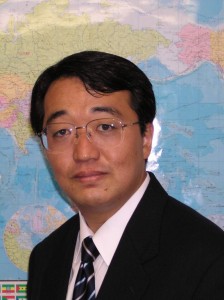緊張と統合:内村鑑三におけるキリスト教と日本の精神
このシリーズでは、私が1994年に執筆した統一神学大学院(Unification Theological Seminary)の神学課程修士論文(Divinity Thesis)を日英二か国語で掲載している。
3.無教会運動における司牧の概念の続き
内村の立場は、プロテスタント神学よりも更に徹底した主観主義である。彼は形式主義を拒絶するがゆえに、典礼が救いに至る為の必要不可欠な道であるということも、断固として否定するのである。彼はそれらが無意味だと言っているのではない。それらは正しく行われるときには福音の本質を目に見える形で示してくれ、良き交わりの場を提供してくれる。しかしそれらが救いにとって必要不可欠であると見られるときには、そこに間違いが生ずるのである。彼の見解は、彼自身の日記の中に良く表現されている。
九月一三日 夕は澄みて美しかりき。宛かも食に外出せんとせし時、思想は余に臨めり、余が肉に死せる時は悪魔は余を撃つ能はざるなりと。而かして此の『罪に死すること』は、余の罪深き心を覗き見ることに依るに非ず、ただ十字架に釘けられ給ひし「イエス」を仰ぎ見ることに依りて、成就せられ得るなり。余は余を愛し給ふ彼によりて勝ち得て余りある者たり得るなり。この思想は限りなき元気を与へたり、其の日のすべての重荷は全く忘れられぬ。感謝は余の心を満たしたり、余は主の晩餐に与ることによりて此の日を記念せんと欲したり。かくて余は一房の野葡萄より僅かの果汁を搾り、それを小なる陶器皿に入れぬ。また余は「ビスケット」の一小片を割けり。余は其等を清潔に洗濯せられたる「ハンカチーフ」の上に置き、其の前に座せり。感謝と祈祷の後に、余は感謝に満てる心を以て主の体と血とに与りぬ。神聖限りなし。余は此を余の生涯の間に繰り返し反復せざるべからず。
『冒涜である! 聖典礼をもてあそぶものである』と教会主義と他の法王的の諸主義はこれに対して言うであろう、しかし何故にロマ法王とその仲間の司祭たちはこのサクラメント(秘蹟、聖礼典)の問題において反対し、我々が最も主の死を記念したいと思う時にそれを記念するこの特権を諸君と同じ人間である我々に惜しむのであるか。もし法王がこの儀式を執行する何ら独占的の権威を有せず、彼の基督代表権は単なる想像上の虚構に過ぎないとすれば、なんじはなんじの『使徒継承権』を支持するにいかなる権威を有するか。(岩波、前掲書、pp.168-169)
無教会キリスト教徒達は、聖典礼重視主義が直接的に制度尊重主義に至ったと主張する。なぜなら聖典礼を執り行うためには祭司が必要であり、秩序と統一への必要が基本的な諸制度を要求するようになったからである。そして結局は、祭司や司教によって構成される制度的な教会を通してのみ、救いを手に入れることが出来ることになっていったのである。これに対し無教会キリスト教徒達は、救いはキリストを通して直接成し遂げられるものであり、必要なものは信仰のみであり、またそれで充分であると信ずるのである。
III. Concept of Ministry in Mukyokai Movement (Cont.)
Uchimura’s position is far more thoroughgoing subjectivism than Protestant theology. His rejection of formalism includes the firm rejection of the sacrament as the indispensable way to salvation. He does not insists that they are meaningless. When they are correctly used, they offer the essence of the gospel visibly and provide an occasion for fellowship. They are only wrong if one looks on them as indispensable for salvation. His view is well expressed in his diary:
Sept. 13.- Everything was serene and beautiful. Just when I was going out to my supper, thought came to me that devils cannot attack me when I am dead in the flesh. And this “death to sin” can be accomplished, not by looking into my sinful heart, but by looking up to Jesus crucified. I can be more than a conqueror through Him that loved me. The thought was extremely refreshing, and all the burdens of the day were entirely forgotten. Gratitude filled my heart, and I wished to commemorate the day by participating in the Lord’s supper. So I pressed a little porcelain dish. Also I cut a small piece of biscuit. I placed these upon a cleanly-washed handkerchief, and I sat in front of them. After a thanksgiving and a prayer, I took the Lord’s body and blood with very thankful heart. Extremely sanctifying. I must repeat this again and again during my life.
“Sacrilegious! Playing with a holy ordinance,” the Churchism and other Popish-isms will say to this. But why defy the Roman Pope and his fellow priests in this matter of the Sacrament, and grudge to us the same mortals as yourselves this privilege of remembering the Lord’s death when we feel most to do so. If the Pope has no executive authority of sanctifying this ceremony, and his vicarship a mere figment of imagination, what authorities have you is to support your “apostolicity?”(21)
The Mukyokai Christians insist that Sacramentalism led directly to institutionalism because administration of the sacrament required priests and the need for order and uniformity in its administration required canonical institutions. Eventually, a Christian could attain salvation only through the institutional church as structured by the priests and bishops. The Mukyokai Christians believe that salvation is achieved directly through Christ, that faith alone is necessary and sufficient.(22)
(21)Uchimura, How I became a Christian, p.157.
(22)Caldarola, p.52.
